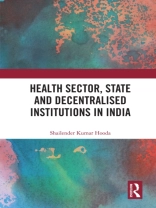This book describes the transition in Indian healthcare system since independence and contributes to the ongoing debate within development and institutional economics on the approaches towards reform in the public health system. The institutional reform perspective focuses on examining the effective utilisation of allotted resources and improvements in delivery through decentralisation in governance by ensuring higher participation of elected governments and local communities in politics, policymaking and delivery of health services. It discusses the economic (resource) reforms to explain the relevance and expansion of state interventionism along with its influence on the health sector, accountability and allocative efficiency. The author also explores the connections between neoliberal thought and privatisation in health sector, and examines the greater role of insurance-based financing and their implications for health service access and delivery. The book offers ways to address long-standing systemic and structural problems that confront the Indian healthcare system.
Based on large-scale surveys and diverse empirical data on the Indian economy, this book will be of great interest to researchers, students and teachers of health economics, governance and institutional economics, political economy, sociology, public policy, regional studies and development studies. This will be useful to policymakers, health economists, social scientists, public health experts and professionals, and government and nongovernment institutions.












